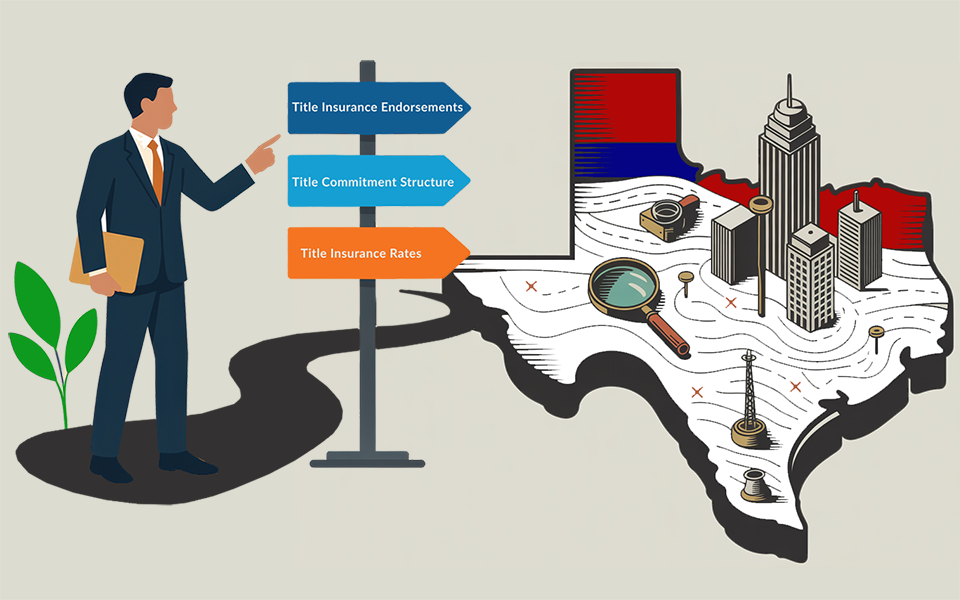December 22, 2025
Generating New Business for Title Companies in a Competitive Market

Why Title Companies Must Evolve to Stay Competitive
The title industry is transforming. Increased competition, technological advancements, and shifting consumer expectations are challenging traditional referral-based business models. Title companies that fail to adapt risk being overshadowed by competitors that embrace strategic marketing, digital engagement, and operational efficiency.
Historically, title companies have relied on word-of-mouth referrals from real estate agents, lenders, and attorneys. While this remains a powerful source of business, it is no longer enough. The modern real estate landscape demands a proactive approach to marketing and client acquisition.
This article provides a step-by-step roadmap for title companies at every stage:
- Beginner-level companies will learn how to establish a strong foundation through branding, networking, and a professional online presence.
- Growing companies will discover how to expand their reach using digital marketing, content strategies, and search engine optimization.
- Established companies will learn how to scale their business with automation, advertising, and strategic partnerships.
By the end of this guide, every title company—whether new or experienced—will have actionable strategies to generate new business, attract high-value clients, and increase revenue.
Section 1: Foundational Marketing for Title Companies
Laying the Groundwork for Long-Term Success
Before implementing complex marketing strategies, title companies must first establish a solid foundation. Without a strong brand, professional online presence, and industry credibility, even the most advanced marketing tactics will fail to deliver consistent results.
1. Build a Strong, Recognizable Brand
A company's brand is more than just its logo or name. It is the perception that clients, partners, and competitors have about its services, professionalism, and reliability. In an industry built on trust, branding plays a critical role in attracting and retaining business.
Key elements of a strong brand identity:
- Unique value proposition (UVP): Clearly define what differentiates your title company from competitors. Is it superior customer service, faster turnaround times, or advanced technology?
- Professional logo and design: A clean, modern design that conveys professionalism and reliability.
- Consistent branding across all platforms: Use the same colors, fonts, and messaging on your website, social media, and marketing materials.
- Memorable tagline: A simple, effective phrase that encapsulates your brand message. Example: "Secure. Reliable. Efficient Closings."
Measuring brand success:
- Track brand awareness through surveys asking how clients heard about you
- Monitor social media mentions and sentiment
- Measure direct website traffic (people typing your company name directly)
- Calculate brand-driven conversion rates
2. Optimize Your Website for Conversions
A website is often a potential client's first impression of your business. Visitors will leave and seek out competitors if it is outdated, slow, or difficult to navigate.
Must-have pages on a title company website:
- Home page: Clearly communicate your services, experience, and why clients should choose you.
- Services page: Provide a detailed breakdown of your offerings with simple explanations.
- About page: Highlight your experience, team, and company history to build credibility.
- Testimonials page: Showcase real reviews and case studies to build trust.
- Contact page: Make it easy for potential clients to reach you by phone, email, and a contact form.
Best practices for an effective website:
- Ensure your site is mobile-friendly (over 60% of searches come from mobile devices).
- Optimize for fast loading speed (websites that take longer than 3 seconds to load lose potential clients).
- Use clear call-to-action (CTA) buttons like "Request a Title Search" or "Get a Free Consultation."
- Implement live chat or AI-powered chatbots to assist visitors in real-time.
Website performance metrics to track:
- Page load time (aim for under 2 seconds)
- Bounce rate (ideally below 40%)
- Average session duration (target 2+ minutes)
- Conversion rate (form submissions, quote requests)
- Mobile vs. desktop user experience metrics
3. Establish Credibility with Social Proof
Trust is one of the most critical factors in a title company's success. Potential clients want to know that they are working with a reputable, experienced provider.
Ways to build credibility and trust:
- Google Reviews: Encourage satisfied clients to leave positive reviews. The more high-quality reviews, the better your search ranking.
- Case Studies: Showcase real-world examples of successful transactions, highlighting how your company solved challenges.
- Industry Certifications: Display memberships with ALTA, TLTA, or other associations to reinforce legitimacy.
Credibility metrics:
- Number and average rating of online reviews
- Testimonial conversion impact (how testimonials affect page conversion rates)
- Referral rates from past clients
- Client retention percentage
4. Leverage Networking and Referrals
Even in the digital age, relationships remain a key driver of business growth in the title industry.
Strategies to build a strong referral network:
- Partner with real estate agents and lenders: Offer exclusive deals, educational resources, or co-marketing opportunities.
- Attend real estate networking events: Meet potential referral partners and establish credibility in the industry.
- Join local business organizations: Consider joining the Chamber of Commerce, real estate investor groups, or networking associations like BNI.
Referral program metrics:
- Referral source tracking (which partners send the most business)
- Referral conversion rates compared to other lead sources
- Cost per acquisition for referral-based clients
- Lifetime value of referred clients vs. other acquisition methods
Section 2: Internediate Marketing Stratefies
Expanding Your Reach and Digital Presence
Once a title company has established its foundation, it will leverage digital marketing and content strategies to attract a broader audience.
1. Search Engine Optimization (SEO) for Title Companies
SEO ensures that your business appears when potential clients search for title services online.
Essential SEO strategies for title companies:
- Optimize for local search: Claim and fully optimize your Google Business Profile to appear in local search results.
- Use relevant keywords: Focus on terms like "title search services," "real estate due diligence," and "property title solutions."
- Create location-specific pages: If serving multiple markets, develop separate pages for each area to improve search rankings.
SEO performance metrics:
- Organic search traffic growth (month-over-month)
- Keyword rankings for target terms
- Local pack appearances for geo-specific searches
- Click-through rates from search results
- Conversion rates from organic traffic
2. Content Marketing: Educate and Attract Clients
Providing valuable content positions your title company as a knowledgeable authority in the industry.
Types of content that generate leads:
- Blog posts: Topics like "What Does a Title Search Do?" or "How Title Insurance Protects Homebuyers."
- Videos: Short, informative clips explaining common title issues and solutions.
- Email newsletters: Regular updates with market trends, legal changes, and success stories.
Content marketing metrics:
- Content engagement rates (time on page, social shares)
- Lead generation per content piece
- Email open and click-through rates
- Content-driven conversion rates
- Return visitors from content marketing efforts
3. Social Media Marketing for Title Companies
A strong social media presence helps build relationships, showcase expertise, and engage potential clients.
Best platforms for title companies:
- LinkedIn: Connect with real estate professionals and industry partners.
- Facebook and Instagram: Share testimonials, behind-the-scenes content, and industry insights.
- YouTube: Upload educational videos that explain key aspects of the title process.
Social media metrics:
- Engagement rate by platform and post type
- Follower growth rate
- Social media referral traffic to your website
- Conversion rate from social media traffic
- Social sentiment analysis
Section 3: Technology Solutions for Modern Title Companies
Leveraging Technology to Improve Efficiency and Client Experience
In today's digital-first environment, technology adoption is no longer optional for title companies seeking to stay competitive.
1. Digital Closing Solutions
The closing experience has traditionally been paper-heavy and time-consuming. Modern technology solutions are transforming this process.
Key technologies to implement:
- eClosing platforms: Enable remote closings with digital document signing.
- Remote Online Notarization (RON): Allow notarizations to be completed virtually, expanding your service area.
- Digital escrow solutions: Provide secure, transparent fund transfers.
Technology implementation metrics:
- Reduction in closing time (average minutes saved)
- Client satisfaction scores for digital vs. traditional closings
- Error reduction percentages
- Cost savings from reduced paper and physical space needs
- Percentage of closings completed digitally
2. Title Production Software
Streamlining backend operations is crucial for maintaining profitability while improving service quality.
Essential software solutions:
- Automated title search platforms: Reduce research time and improve accuracy.
- Document management systems: Organize and secure sensitive client information.
- Cloud-based title production software: Allow team members to collaborate from anywhere.
Production efficiency metrics:
- Average time to complete title searches
- Error rates in title reports
- Staff productivity metrics
- Cost per transaction
- Technology ROI measurements
3. Client Communication Technology
Meeting modern clients' expectations requires responsive, transparent communication systems.
Communication technology to implement:
- Client portals: Provide secure access to transaction status and documents.
- Automated updates: Send milestone notifications automatically.
- CRM systems: Track all client interactions and ensure consistent follow-up.
Communication technology metrics:
- Response time averages
- Client portal usage rates
- Communication satisfaction scores
- Reduction in status update calls
- Time saved per transaction
Section 4: Advanced Strategies for Scaling
Automating, Advertising, and Expanding Business
Advanced strategies such as paid advertising and automation can drive significant results for companies ready to accelerate their growth.
1. Paid Advertising: Scaling with Google Ads and PPC
Google Ads can generate immediate leads by targeting high-intent search terms.
Best practices for paid advertising:
- Use Google Search Ads targeting searches like "title company near me."
- Implement retargeting ads to stay visible to potential clients who visited your site but didn't convert.
Advertising metrics:
- Cost per click (CPC)
- Cost per acquisition (CPA)
- Ad quality scores
- Conversion rates by ad campaign
- Return on ad spend (ROAS)
2. Automate Client Outreach and Lead Nurturing
Marketing automation saves time and increases conversion rates.
Tools for automation:
- CRM systems: Track leads and automate follow-ups.
- Email marketing: Set up automated sequences for new inquiries and past clients.
- AI chatbots: Handle inquiries 24/7, improving responsiveness.
Automation performance metrics:
- Lead response time
- Lead nurturing conversion rates
- Time saved through automation
- Client engagement with automated communications
- ROI on automation tools
Section 5: Overcoming Common Challenges
Addressing Pain Points in Title Company Marketing
Even with the best strategies, title companies often face specific obstacles when implementing marketing initiatives. Here's how to overcome them:
1. Challenge: Limited Marketing Budget
Many title companies, especially smaller operations, struggle with allocating sufficient funds to marketing.
Solutions:
- Start with free or low-cost channels: Focus on Google Business Profile optimization, social media, and relationship building.
- Track ROI meticulously: Measure the return on every marketing dollar to justify increased budgets.
- Phased implementation: Start with one or two high-impact strategies rather than trying everything at once.
- Co-marketing opportunities: Share costs with complementary businesses like mortgage lenders or real estate agencies.
2. Challenge: Compliance and Regulatory Concerns
The title industry is heavily regulated, making some marketing approaches challenging.
Solutions:
- Create a compliance review process: Have legal experts review marketing materials before publication.
- Develop compliant templates: Create pre-approved messaging frameworks for common marketing needs.
- Focus on educational content: Position marketing as informational rather than promotional.
- Stay updated on regulations: Join industry associations that provide regulatory updates and marketing guidance.
3. Challenge: Differentiating in a Commoditized Market
Many clients see title services as interchangeable, making it difficult to stand out.
Solutions:
- Emphasize unique service aspects: Focus marketing on specialized expertise or superior customer experience.
- Showcase technology adoption: Highlight how your digital solutions make closings faster and more convenient.
- Tell client success stories: Use specific examples of how you've solved challenging title issues.
- Create proprietary processes: Develop and name unique service approaches that competitors don't offer.
3. Challenge: Marketing to Multiple Audiences
Title companies must appeal to both referral sources (agents, lenders) and end clients.
Solutions:
- Segment marketing efforts: Create separate campaigns and materials for different audience types.
- Develop audience-specific value propositions: Emphasize different benefits for various stakeholders.
- Create dual-purpose content: Design materials that referral sources can share with their clients.
- Host combined events: Bring together referral partners and potential clients to build relationships simultaneously.
Conclusion: Take Action and Stay Competitive
Generating new business requires a combination of strategy, consistency, and adaptability. Your title company can thrive in today's competitive landscape by establishing a strong foundation, embracing digital marketing, leveraging technology, implementing advanced growth strategies, and overcoming common challenges.
Remember that marketing success doesn't happen overnight. Consistently measuring your results and refining your approach based on data will lead to sustainable growth over time.
Start by selecting one strategy from each section of this guide to implement in the next 30 days. Track your results, learn from what works, and gradually expand your marketing efforts to capture more market share and increase revenue.
Related Posts
How to Read a Title Commitment: 12 Exceptions That Scare Buyers (But Don’t Always Kill the Deal)
If you have ever opened a title commitment and felt your stomach drop when you hit the exceptions, you are not alone. Buyers often see a long ....
January 29, 2026
2026 Title Industry Outlook: Top 10 Trends That Will Redefine Due Diligence and Closings
The title industry is heading into 2026 with more moving parts than at any time in recent memory: rapid regulatory change, deeper fraud risk ...
December 22, 2025
Beyond the Basics: Navigating Title Complexity in Texas Commercial Real Estate
Last spring, a Dallas investor was three days from closing on a mixed-use development site when the title examiner discovered something unusual ...
December 22, 2025
Witchy Titles & Cursed Closings: What Salem’s History Can Teach Us About Real Estate Due Diligence
In 1692, the town of Salem, Massachusetts descended into chaos. Fueled by fear, rumors, and suspicion, dozens of people were accused of witchcraft and ...
December 22, 2025
Title Under Siege: A First Look at Our New Guide to Deed Fraud and Seller Impersonation
Seller impersonation, in particular, is on the rise. In these cases, a scammer poses as the property owner—usually targeting vacant land, rental...
December 22, 2025
Real Estate Due Diligence Checklist: 9 Hidden Costs That Kill Closings
Imagine this: A $3.2 million Miami Beach home sale implodes because of a $127 unpaid utility lien that no one caught in time. Absurd as it sounds ...
December 22, 2025
Land Surveys vs. Title Searches: When You Need Both (and How to Budget)
Picture this: you’re days away from closing on a home when an unexpected hiccup surfaces. The seller’s old fence sits two feet inside the neighbor’s...
December 22, 2025
Top 10 Municipal Red Flags That Can Delay Your Closing (and How to Fix Them)
Real-estate contracts are filled with dates, deposits, and delivery deadlines. Yet even when buyers, sellers, and lenders stay on schedule ...
December 22, 2025
How Can Large Title Companies Thrive in Volatile Times?
When mortgage rates climbed to 23-year highs in late 2023, one national title insurer watched transaction volume plummet 45% over eight weeks yet ...
December 22, 2025
Summer Real Estate: Keep Closings Cool When the Market Heats Up
Summer signals one of the busiest times in real estate, especially in Florida, as well as in fast-growing markets like Texas, Arizona, and ...
December 22, 2025
Navigating Florida’s Title Regulations for Small Title Agencies
Running a small to mid-sized title agency in Florida can feel like juggling flaming torches—there’s licensing, escrow accounting, audits, data security ...
December 22, 2025
Top Mistakes When Ordering a UCC Search
UCC Searches are crucial in risk assessment and due diligence in commercial lending and secured transactions. Yet despite their importance, we have ...
December 22, 2025
The Title Pro's AI Companion: Using Skyline's SmartTitle Assistant
How much time did you spend drafting repetitive client emails today? Our average title professional saves 5+ hours weekly using SmartTitle Assistant™ ...
December 22, 2025
UCC Search vs. Title Search: What's the Difference — and Do You Need Both?
In the complex world of real estate transactions, due diligence is everything. Whether you're a lender evaluating a loan application, an investor ...
December 22, 2025
Navigating Market Volatility: What Title Professionals Need to Know Now — and What's Ahead in 2025
In today's real estate landscape, the only constant is change. Fluctuating interest rates, economic uncertainty, and shifting regulatory policies have ...
December 22, 2025
What Happens if a Satisfaction of Mortgage is Not Properly Recorded?
Paying off a mortgage is a significant financial milestone, but the process isn’t complete until the lender records the mortgage satisfaction with the ...
December 22, 2025
Spring Cleaning for Your Property Title: How to Refresh Your Real Estate Records
Millions of real estate transactions are delayed or fall apart each year due to title issues that could have been prevented. In fact, a recent study ...
December 22, 2025
Top Strategies to Prevent Quiet Title Issues
Quiet title disputes are a serious concern for real estate professionals, as they can disrupt transactions and create uncertainty around property ownership ...
December 22, 2025
Title Services for New Construction: What Builders and Developers Need to Know
The construction of a new home or commercial property is an exciting and ambitious project, but it comes with more than just design and building ...
December 22, 2025
Will AI Agents Replace Title Professionals? The Truth About Automation
Artificial intelligence (AI) has evolved beyond simple data analytics and chatbots. Today's AI "agents" can interact with web browsers, gather and analyze ...
December 22, 2025
10 Reasons Why Skipping a Land Survey Can Be Costly
A land survey might seem like an unnecessary expense, especially if the property has been owned for years without any issues. However, skipping this step ...
December 22, 2025
Title Industry 2.0: Harnessing AI, Data, and Cybersecurity for a Resilient Future
The title industry is at a crossroads. Traditional methods that have served us well for decades now face mounting challenges in an increasingly ...
December 22, 2025
How Title Services Impact Mortgage Underwriting Timelines
In the world of real estate, the journey from application to closing is filled with numerous moving parts. Among these, title services are a crucial yet ...
December 22, 2025
How Title Companies Can Meet Tight Deadlines Without Sacrificing Quality
In today's fast-paced real estate environment, speed is crucial. Title companies often find themselves in high-pressure situations where they must juggle ...
December 22, 2025
5 New Year's Resolutions for Title Companies in 2025
As 2025 kicks off, the title industry is moving faster than ever. With new technologies, shifting customer needs, and more complex regulations, there’s ...
December 22, 2025
How to Explain Title Insurance to Your Clients: A Real Estate Agent's Guide
Explaining title insurance isn't always straightforward, but with the right approach, it can become a valuable teaching moment for your clients. Picture this ..
December 22, 2025
The Hidden Complexities of Property Title Searches
You've found your dream home. The price is right, the location is perfect, and you're ready to sign on the dotted line. But before you do ...
December 22, 2025
What’s Next for the Title Industry? Key Trends for 2025
The title industry is at a pivotal moment, with 2025 shaping up to be a year of significant transformation. From groundbreaking technologies like blockchain ...
December 22, 2025
Commercial Property Title Due Diligence: Going Beyond the Basics
The landscape of commercial property title due diligence has transformed dramatically over the past three decades. Gone are the days when a basic title ...
December 22, 2025
Beyond the Standard Search: Advanced Commercial Title Due Diligence in Florida
Last month in South Florida, a seasoned commercial real estate investor nearly walked away from a $12 million mixed-use development purchase ...
December 22, 2025
Navigating the Cyber Minefield: A Title Professional's Complete Guide to Phishing Defense
The title industry is a prime target for cybercriminals, and phishing is one of the most common threats that title professionals face today. Imagine this ...
December 22, 2025
Elevating Your Title Company to New Heights - A Blueprint for Growth
Let's be honest – growing a title company isn't what it used to be. Gone are the days when simply maintaining the status quo was enough to ...
December 22, 2025
This Halloween Avoid Real Estate Nightmares: 5 Spooky Title Issues That Can Haunt You
Buying a new home is exciting, but not all surprises are welcome. Some title issues can be like ghostly figures lurking in the shadows ...
December 22, 2025
How to Overcome Common Title Operations Challenges and Boost Efficiency
Running a title company means you’re a key player in the real estate world, making sure property transactions go smoothly and securely. But, we get it ....
December 22, 2025
🎙️QuickCast: Future Trends in the Title Industry.
The title industry, like many others, is undergoing significant transformation due to technological advancements. While some of these changes ...
December 22, 2025
Understanding Municipal Lien Searches: A Complete Guide
Imagine this scenario: You've discovered an incredible property, yet as the closing date approaches, an unsettling surprise reveals itself—a municipal lien...
December 22, 2025
Wire Fraud : Proven Defense Tactics for Title Professionals
Wire fraud is a rapidly growing threat in the real estate industry, with fraudsters becoming more sophisticated and aggressive in their ...
December 22, 2025
Preparing for August 17th: Essential Information on the NAR Broker Commission Changes
The real estate market is about to undergo significant changes as new commission regulations take effect on August 17. These changes ...
December 22, 2025
Maximize Efficiency in Your Title Business with AI
Integrating AI into title businesses can significantly enhance efficiency, accuracy, and customer service. By automating routine tasks, improving...
December 22, 2025
The Importance of Land Surveys in Property Transactions: What You Need to Know
Boundary surveys are essential in property transactions to accurately define property lines, identify encroachments, and resolve disputes. Conducted ...
December 22, 2025
Summer Selling Season: Essential Steps for Real Estate Pros to Ensure Smooth Transactions
Essential steps for real estate professionals to ensure smooth transactions during the bustling summer selling season include preparing properties, ...
December 22, 2025
Recent Posts

















































.png)



